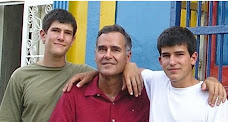A nice feature of a blog is that you can easily change, correct, and add to previous posts. On a previous entry on RCTV and freedom of the press, I made some mistakes describing the course of events at the National Assembly when pro-RCTV students walked out on their chance to take part in a nationally televized debate with the pro-government students. After re-reading an excellent article by George Ciccariello-Maher, a doctoral student from Berkeley who lives in Caracas and was at the scene, I´ve corrected the inaccuracies.
This entry is worth re-reading because the opposition is now calling for help from the U.S. State Department. Manuel Rosales, the governor of the State of Zulia who lost overwhelmingly to Chavez in the presidential election last December, just met with Undersecretary of State for the Western Hemisphere Thomas Shannon in Washington and asked directly for help in putting ¨international pressure¨on Venezuela (we can assume he will also get help from the CIA and other experienced ¨helpers¨) in order to derail and/or de-legitimize the constitutional reform process and vote that will take place in December. Rosales makes the strange claim that a vote to reform the constitution is in fact a ¨constitutional coup d etat.¨ (In 2002, Rosales showed up at the presidential palace in Caracas to shake hands with those who carried out a real coup against Chavez)
Also, the other day at the National Theater in Caracas, opposition supporters and reporters acted very aggressively as they tried to interrupt and provoke a confrontation with pro-reform students who were trying to speak. This may be sign that more attempts to provoke violence
or frighten the populace before the vote.
A reader has written to ask what´s happening locally in response to the proposed reforms and I just answered the following (I´ll follow up with a longer article in the future):
The constitutional reforms are being talked about all the time. There are fairly large public meetings, discussions at comunity councils, and also smaller neighborhood meetings. I´ve actually bumped into some of these in Sanare by accident, because neighbors have pulled 15 or 20 chairs out of their houses and set up a meeting on the sidewalk -- people have copies of the reforms in front of them and pick out the ones they want to know more about. Sentiment around here is very much pro-reform, although a couple of small business owners have told me they think Chavez is crazy and they think all private property will be abolished someday, including theirs.
Television talk shows are doing a good job of explaining each provision in detail, the possible ramifications, and changes that are being proposed before the vote in December. I´ve had good discussions with campesino neighbors in front of their TVs -- they have a much better grasp of each provision than the small businessmen above. Last night at one house we talked about the land reform law that would affect latifundios (this is probably a reform that is scaring the small business types),which will no longer be able to larger than 5,000 hectares (still really big, more than 10,000 acres). This seemed pretty huge to me since there are no farms close to that size around here, but my neighbors said the reform was crucial to getting people resettled and working in agriculture. They pointed out that there are many latifundia many times larger than 5,000 hectares in los llanos and the southern and eastern states of Venezuela.
Friday, October 19, 2007
Subscribe to:
Post Comments (Atom)












No comments:
Post a Comment